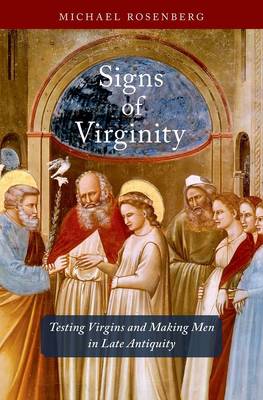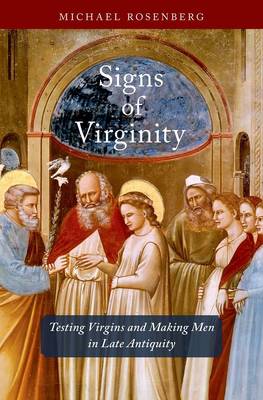
- Retrait gratuit dans votre magasin Club
- 7.000.000 titres dans notre catalogue
- Payer en toute sécurité
- Toujours un magasin près de chez vous
- Retrait gratuit dans votre magasin Club
- 7.000.0000 titres dans notre catalogue
- Payer en toute sécurité
- Toujours un magasin près de chez vous
Signs of Virginity
Testing Virgins and Making Men in Late Antiquity
Michael Rosenberg
Livre relié | Anglais
168,45 €
+ 336 points
Description
Although the theme of bloodied nuptial sheets seems pervasive in western culture, its association with female virginity is uniquely tied to a brief passage in the book of Deuteronomy detailing the procedure for verifying a young woman's purity; it seldom, if ever, appears outside of Abrahamic traditions. In Signs of Virginity, Michael Rosenberg examines the history of virginity testing in Judaism and early Christianity, and the relationship of these tests to a culture that encourages male sexual violence. Deuteronomy's violent vision of virginity has held sway in Jewish and Christian circles more or less ever since. However, Rosenberg points to two authors-the rabbinic collective that produced the Babylonian Talmud and the early Christian thinker Augustine of Hippo-who, even as they perpetuate patriarchal assumptions about female virginity, nonetheless attempt to subvert the emphasis on sexual dominance bequeathed to them by Deuteronomy. Unlike the authors of earlier Rabbinic and Christian texts, who modified but fundamentally maintained and even extended the Deuteronomic ideal, the Babylonian Talmud and Augustine both construct alternative models of female virginity that, if taken seriously, would utterly reverse cultural ideals of masculinity. Indeed this vision of masculinity as fundamentally gentle, rather than characterized by brutal and violent sexual behavior, fits into a broader idealization of masculinity propagated by both authors, who reject what Augustine called a "lust for dominance" as a masculine ideal.
Spécifications
Parties prenantes
- Auteur(s) :
- Editeur:
Contenu
- Nombre de pages :
- 328
- Langue:
- Anglais
Caractéristiques
- EAN:
- 9780190845896
- Date de parution :
- 07-02-18
- Format:
- Livre relié
- Format numérique:
- Genaaid
- Dimensions :
- 165 mm x 239 mm
- Poids :
- 616 g

Les avis
Nous publions uniquement les avis qui respectent les conditions requises. Consultez nos conditions pour les avis.






